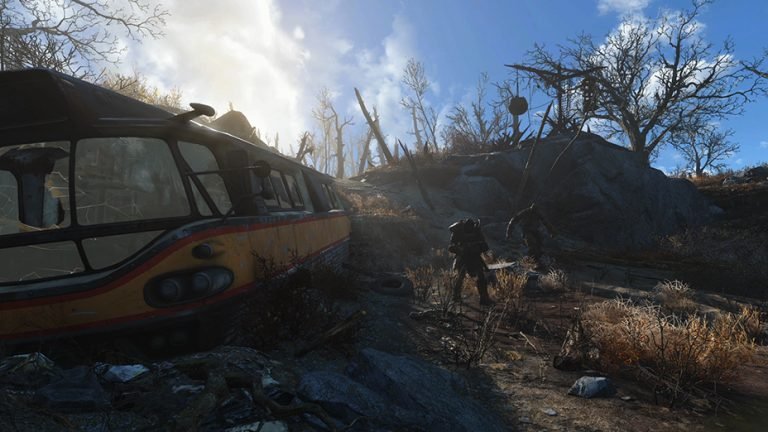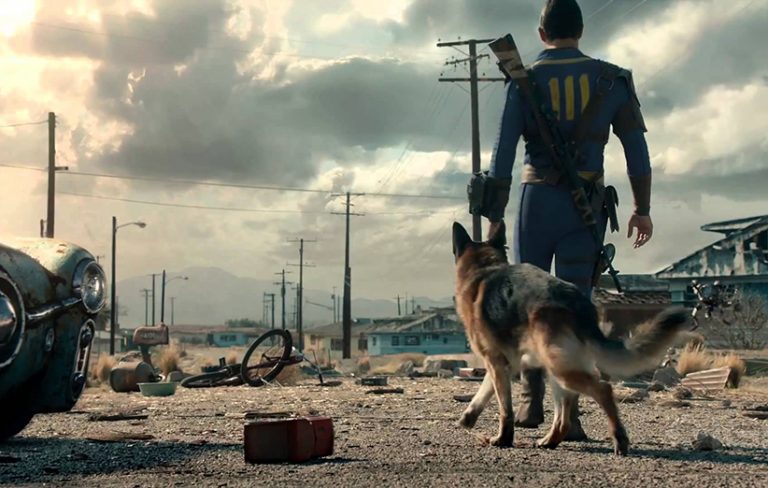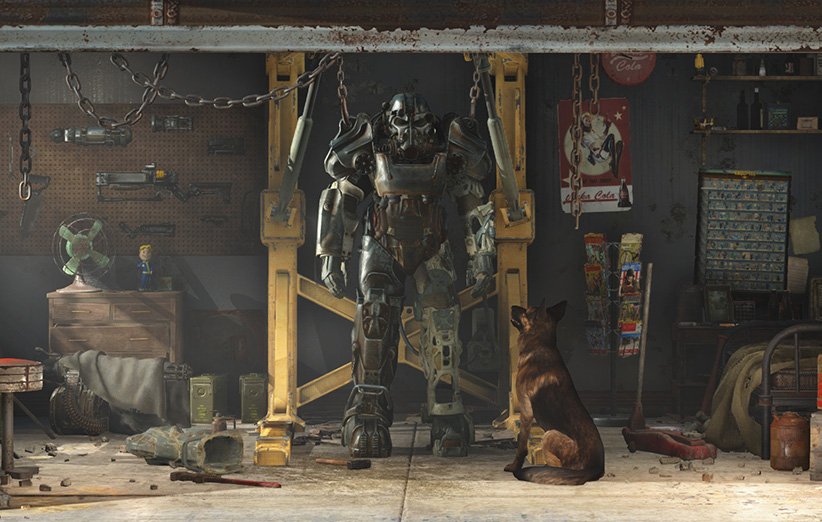Fallout 4 seems to want to be everything and do everything; You can make a craft and a city, and most interestingly, it also comments on politics. They can be found in the e-mails of commercial company servers that have been unused for years, in companies that circumvented the rules in now defunct labs and ended up with the destruction of civilization.
This is a game that is told in two different times: before the fall of the atomic bomb and after the fall of the atomic bomb. The problem, however, is that despite what at first appears to be a scrutinizing look at society in the gap between these two eras, the structure and ideology of the pre-bomb world has been exactly replicated in the post-bomb era. So what exactly is the difference between these two that he wants to scrutinize?
When the Sole Survivor wakes up in the basement after two hundred years of cryogenic life, and two hundred years have passed since the first atomic bomb hit his place of residence, the city of Boston; After softening a bit and removing his weapon, Del goes to the fields to find his lost child. For the player who sees the chaos, violence, and isolation of this world, he may at first think that it is an apocalyptic world, and undoubtedly, this is the scene that the creators themselves wanted to portray. However, this is not unusual for the sole survivor. There is no reaction when confronted with the skeletal remains of people on the floor of a restaurant that must have once been full of life and vitality, and the vehicles that still have gas in the tank and are lying on the street corner are obvious. It is not even surprising to him why no one has ever thought of touching them.
Anthropologist Claude Levi-Strauss, in his book Tristes Tropiques, laments that the spread of Western civilization has replaced cultural pluralism with the suburbs of identity (1) and slums: “Mankind has decided to reach a single culture; It is in the process of building a mass civilization, just as the root of a beet grows in a mass. Therefore, human daily strength is fed only from this.” This means that history is in a process of convergence in which the new and the old cannot be separated; History as a concept no longer serves to differentiate [for example between religions, ethnic groups and races]. The main character in Fallout 4 falls asleep in a world built around the demands of late capitalism, and of course no one wakes up to find that the underlying ideology of the society from which it originated has remained essentially unchanged.

Late Capitalism is the stage that Fallout 4 embodies, and both intentionally, and more often than not, it seems, inadvertently, infuses it into every aspect of its world. Despite the absence of companies and enterprises, the clearest manifestations of capital, the signs of capitalism and its ideologies have been reproduced again in the post-bomb world and remain intact as before. The two branches of late capitalism, neoconservatism and neoliberalism, both appear as the two main habitats of the world of Fallout 4. Diamond City is neoconservative, values ethics and adherence to legal requirements, and constantly revolves around ideas such as controlling gender and identity. The town of Goodneighbor is also neoliberal, with immoral [not to be confused with immoral] means and ends, whose residents enjoy drugs, jazz, and state-sanctioned lone survivors to commit violence against the residents of the same habitat.
The main character tells anyone who will listen that he is 200 years old, and the journalist who interviews him does not even ask him, for example, “what the world was like before nuclear bombs.” On the other hand, the main character never shows any interest in this world and how it was destroyed or why it is now full of mutant cannibals. Neither he nor the other characters who populate Boston ask these questions because they cannot imagine the world to be different from the one they imagine, and, consequently, cannot create a new world when capitalism has occupied everything imaginable.
The entities of the world of Fallout 4 look just as familiar. The Brotherhood of Steel is concerned only with maintaining the status quo and pursues two goals: collecting and consolidating all technology to keep it out of the hands of the common people, and destroying all creatures that mutated after the atomic bomb hit the United States. And they came into being. The Institute is also concerned with the advancement of science, but at the same time it hides itself from the common people so that they don’t get their hands on these things. Both institutions are very obsessed with continuing their work and to some extent with their survival. These are the same institutions that we face every day, from the university to the political party, who do nothing but protect themselves at any cost and resist any meaningful change.
After the fall of nuclear bombs and the atomic bomb, which could be the only way to end capitalism, the world has become static. Despite the passage of centuries since those days, there are still a lot of unopened canned goods left in the ruins of the houses, valuable military hardware is still working and no one has visited them on time, and the skeletons are still dried in place in the same state as they were before death. The main character has not changed, just like the society he joins. Their way to make a serious change collectively is blocked and only on an individual level they can bring about such a change. This is a necessary feature of neoliberal ideology, in which the individual is free to fulfill his potential within the existing society without concern for the rest of the population or the future. The main character can expand his universe as far as the inhabitants of this world determine with their whims, which, of course, most of these interactions with these inhabitants are transactional and rarely go beyond “go there and kill him”. The successful player is the player who kills or suppresses in the name of others to maintain the status quo by any means.
There is a quest in the game called “Cleansing the Commonwealth”, which is activated after talking to Knight Rhys from the Brotherhood of Steel sect, and to solve it, it is necessary to go to a certain place and destroy everything in it. do. When I finished the quest, I went back to Reyes to get my reward, and then he told me to go to another place and repeat the same thing. This happens again and again without end, and each place is again filled with corpses whose ultimate goal is to be genocided again. This is the result of one of the flagship technologies of Bethesda Softworks: Radiant artificial intelligence, which was first introduced in their other game, The Elder Scrolls IV: Oblivion, and was designed in such a way that without adding Dialogue or more design, the quest game system itself. The result of such a system is a kind of alienation and basic dislike of narrative methods. The purpose of the quest is to clear an area of nasty creatures, but in fact, every time you come back, you see that they have reappeared and revived, so there is no change in this world, and you only get paid for the service you do.

This quest probably best shows the relationship I had with this game: the futility and the feeling that my purpose in this world is always something secondary and trivial. It’s fair to say that while the main character isn’t narratively free to react to the absurdity of the world he’s in, it’s equally unreasonable to expect the main character to challenge the ego of the game itself on a metatextual level. But I have to disagree and assume that if the main character is deprived of having an independent identity due to his limited interaction with the surrounding environment, then the player only has the role of a passive observer of this character, and is not freer than a linear shooter game. The thing is, the onus is on our main character or protagonist to react to this calcified world on our behalf, and not just be a tool in the hands of NPCs who use him to do violence against this and that.
Frederick Jameson points out that “it’s easier to imagine the end of the world than to imagine the end of capitalism”, and Fallout 4 takes this statement to its logical limit. Bethesda has created a world that, although it has an apocalyptic look and is full of ruins, but at the same time, all the pre-apocalyptic capitalist ideology has spread in its place just as intact. Which is scarier: to wake up after 200 years and realize that the world was destroyed all this time, or to wake up and see that nothing has changed at all?
The main character tells anyone who will listen that he is 200 years old, and the journalist who interviews him does not even ask him, for example, “what the world was like before nuclear bombs.” On the other hand, the main character never shows any interest in this world and how it was destroyed or why it is now full of mutant cannibals. Neither he nor the other characters who populate Boston ask these questions because they cannot imagine the world to be different from the one they imagine, and, consequently, cannot create a new world when capitalism has occupied everything imaginable. This insistence that every sane person only accepts and likes the existing conditions is the same ruling ideology of late capitalism that echoes in Margaret Thatcher’s slogan when she says, “There is no alternative.”
The world of Fallout 4 is a parody of and aware of Fordist capitalism, but the ideology it implicitly represents, despite its 1950s appearance, is more akin to modern individualistic consumerist capitalism. The villain of the series, also found in this issue, is Vault-Tec, a private army and puppet of the government that operates without a vision, and whose pre-war commercial interests send people into underground bunkers to experiment on. This could go on as long as there was a threat of nuclear war, and it’s implied throughout the game that they fully knew this would happen. When capital was able to find a way to make money from the destruction of civilization, it was inevitable that private sector interests would act instead of the government. The terminals throughout the game, which still work and fill the offices, contain emails explaining how these companies operate; From their exploits to their experiments on their employees to adhere to government contracts, without tangible results. This is reminiscent of Tony Blair’s [former UK Treasury Secretary] Private finance initiative, which was implemented by institutions such as Serco and G4S, and when bureaucratic deployments, visits, and expansion took serious consideration of Public service was a priority.
If corporations [such as Vault-Tec] are portrayed in such an exaggeratedly negative light in Fallout, to the point of being the cause of the apocalypse, it’s worth asking how, despite this anti-capitalist slogan, it also implicitly follows a capitalist ideology? It can be said that this violation of purpose, instead of challenging, feeds capitalism itself rather than harming it. Robert Pfaller calls this idea Interpassivity, where art can fill in the performative side of anti-capitalism on our behalf, to feel that we have distanced ourselves from capitalism enough to think it was us who challenged it. Slavoj Žižek writes that “cynically distancing ourselves [from capitalism] is simply a way of blinding ourselves to the power structure of ideological fantasy: Even if we don’t take it seriously, even if, in an ironic way, we distance ourselves from it, it still means that we are playing in its own field. By criticizing capitalism on an individual level and by pushing its other larger social factors under the carpet, Fallout 4 can take on the face of a critic and at the same time be completely orthodox and strictly adhere to the principles of capitalism itself.

I have no right to demand that Bethesda put a socially effective interpretation of the world into its game, but it is not too much to say that the game is now depicting the future in such a way that it looks different from the past and not exactly the same. to be restored This is especially noticeable when we see that he does not make much effort to understand the present.
Frederick Jameson points out that “it’s easier to imagine the end of the world than to imagine the end of capitalism”, and Fallout 4 takes this statement to its logical limit. Bethesda has created a world that, although it has an apocalyptic look and is full of ruins, but at the same time, all the pre-apocalyptic capitalist ideology has spread in its place just as intact. Which is scarier: to wake up after 200 years and realize that the world was destroyed all this time, or to wake up and see that nothing has changed at all?
About the author: David Bowman is a physicist at Royal Holloway, University of London, with an interest in exotic magnetism and narrative tools.
First Person Scholar
First look at V Rising – Steam’s buzzing game
